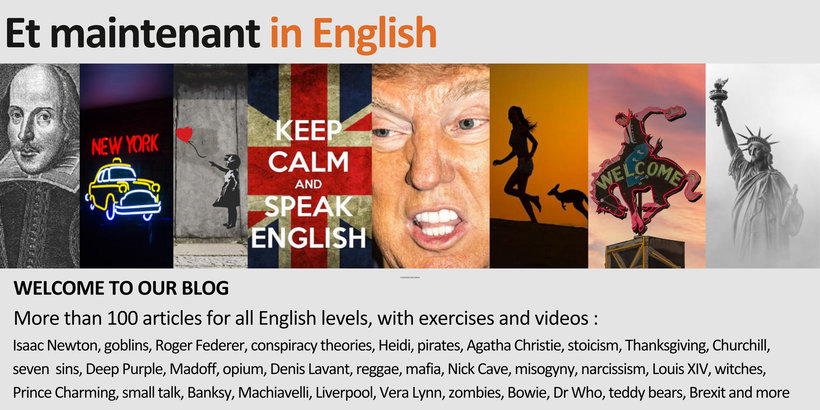Level B1 and above
The World Happiness Report is a survey of the state of global happiness that ranks 156 countries by how happy their citizens think they are.
- With vocabulary and expressions related to happiness, and exercise.
Written and compiled by Benedicte Gravrand, English trainer at The Language House
What is happiness to you? Take your pick:
- Well-being (bien-être)
- Flourishing (i.e. improving health, success or prosperity)
- A feeling
- Tranquillity
- Hedonism (pleasant experiences, pleasure)
- Supporting relationships
- Engaging in interesting and challenging activities
- Material and physical security
- A sense of meaning or purpose
- A positive attitude
- Autonomy or control over your life
- Practice of religion and virtue
- Helping others
- Work and love
According to Stanford, one meaning of happiness is (1) value – a life that goes well according to you. Or one can understand happiness as (2) psychology – a state of mind.
- “Happiness” in the sense of value concerns what benefits a person: well-being, doing well in life, being fortunate. When you think of happiness in that sense, you make a value judgment: I think that the person has whatever it is that benefits a person. If two people have different values, then they may not agree about what a happy life is.
- “Happiness” in the sense of state of mind would include life satisfaction (having a favourable attitude toward one’s life), hedonism / pleasure (having more pleasant than unpleasant experiences); or an emotional state, such as a good mood (the opposite of depression or anxiety).
Words in bold are in the vocabulary exercise below
People have tried to measure happiness, but the best attempt so far has been the World Happiness Report.
Furthermore, this report gives us ideas on how government policies can participate in and improve individual happiness.
The World Happiness Report
The World Happiness Report (WHR) is a survey of the state of global happiness that ranks 156 countries (there are now 195 countries in the world) by how happy their citizens think they are. The first report was published in 2012 and the World Happiness Report 2020 is the eighth report. It focuses on the social environment, urban and rural life, and the natural environment.
The first seven reports were produced by three co-editors in Thimphu, the capital of Bhutan, after the country proposed the idea of the gross national happiness (GNH) index to the United Nations. There are now more editors, as well as many more sources of data.
In 2011, the UN unanimously adopted a General Assembly resolution, introduced by Bhutan with the support of 68 member states, calling for a “holistic approach to development”. This was followed in April 2012 by a UN High-Level Meeting on “Happiness and Well-being: Defining a New Economic Paradigm” designed to bring world leaders, experts, civil society, and spiritual leaders together to develop a new economic paradigm based on sustainability and well-being.
Here are the top ten ‘happy’ countries in the 2020 report:
- Finland
- Denmark
- Switzerland
- Iceland
- Norway
- Netherlands
- Sweden
- New Zealand
- Austria
- Luxembourg
R.E.M – Shiny Happy People
The Swiss are happier than the French
The good news is that Switzerland is a happy country.
France, on the other hand, came in 23rd. One in two French people consider themselves to be “happy”. But the country still ranks far behind other developed nations where economic and social conditions are broadly similar.
The USA came in at 18 and the UK 13th.
Happy Nordic countries
Since 2013, the five Nordic countries – Finland, Denmark, Norway, Sweden, and Iceland – have all been in the top ten.
What exactly makes Nordic citizens so exceptionally satisfied with their lives? The report finds that it mostly comes from the quality of institutions and:
- reliable and general welfare benefits,
- low corruption,
- well-functioning democracy and state institutions,
- better income equality.
Furthermore, Nordic citizens experience subjective well-being and citizen happiness such as:
- a high sense of autonomy and freedom,
- high levels of social trust towards each other,
- social cohesion (i.e. being connected to other people, having good social relations, and having a focus on the common good).
Popular explanations for Nordic happiness such as the small population and homogeneity of the Nordic countries, and a few counter-arguments against Nordic happiness such as the cold weather and the suicide rates, are not closely related to Nordic happiness. Indeed, Nordic countries are quite heterogenous, people adapt to the local weather, and suicide rates are – nowadays – close to the European average.
Three Dog Night- Joy to the World
Ways governments can invest in happiness
The survey shows that part of the citizens’ happiness comes from the way a government runs the country through its institutions. What more can be done?
At the 2018 World Government Summit, where the globe’s most innovative and entrepreneurial thinkers meet each year, participants talked about what politicians and policymakers should be focusing on to create greater happiness during today’s age of anxiety. Here is a list of their recommendations:
- More flexible workplaces
- More investments in mental health care
- Social inclusion, that is, ensure specific socioeconomic, ethnic, or religious groups are not left behind
- An education system that focuses more on social engagement and life-skills such as perseverance and resilience
- Do more to ameliorate the impacts of climate change
- Find new ways to ensure the livelihoods and dignity of workers left behind by the digital revolution
- Income equality and access to high-quality public services
- Spend more on preventative health
- Stronger anti-corruption laws, investigative authorities, greater transparency
- Changes in the workplace, like flexible hours and family leave provisions to improve family-work balance
In 2018, only 22 of the 193 governments of the UN had happiness policies in place. But this may be changing.
Achim Steiner, administrator of the United Nations Development Program (UNDP) said, “There is global recognition that in the last 20-30 years, we have prioritised economic growth, assuming that well-being would follow. We have been reminded recently that this is a mistake – equality, sustainability and opportunity for future generations is what enables wellbeing. This is what our societies should pursue at the beginning of the 21st century.”
Thomas Jefferson already knew that in 1809 when he said: “The care of human life and happiness and not their destruction is the first and only legitimate object of good government.“
James Brown – I got you (I feel good)
Individual responsibility
Psychologist Ed Diener reminds us that happiness is our responsibility too, not just our government’s.
“Is health the responsibility of the state or the individual?,” he says. “Of course, it is both. The state must provide clean water, and track infectious diseases and develop medicines, and so forth—the individual cannot do these things. But the individual should exercise, and eat well, wear seat belts when driving, and refrain from smoking. The state can encourage these things, but usually cannot demand them effectively unless citizens each take responsibility.” The same goes for happiness, he adds.
The government can do its part, so long as this part does not become paternalistic, and individuals must also do their part.
Subscribe to our blog. Leave your email address (right-hand side column) and confirm your subscription when you receive our email
Check the vocabulary
Match the words to their definition:
- Engage
- Purpose
- Perceive
- Improve
- Survey
- Rank
a. to make something better
b. to understand or think about something in a particular way
c. to attract and keep someone’s interest or attention
d. to put someone or something into a position according to their success, importance, size etc
e. the aim that someone wants to achieve, or that something is intended to achieve
f. a set of questions that you ask a large number of people or organizations
______________________________
Answer key:
1:c – 2:e – 3:b – 4:a – 5:f – 6:d
______________________________
- Institution
- Reliable
- Welfare
- Popular
- Argument
- Closely
g. a popular activity, place, thing etc is one that many people like
h. a system that always works well (in this context)
i. a discussion or debate between people with different views, opinions etc. (in this context)
j. adverb used for emphasizing what is really true or what really happened
k. a large organization such as a bank, hospital, university, or prison
l. care provided by the state or another organization for people in need
______________________________
Answer key:
7:k – 8:h – 9:l – 10:g – 11:i – 12:j
______________________________
- Workplace
- Leave someone/something behind
- Like skills
- Livelihood
- Policy
- Recognition
m. something such as your work that provides the money that you need to live
n. to improve or progress much faster than someone or something else
o. a set of plans or actions agreed on by a government, political party, business, or other group
p. the ability to recognise a person or thing (recognise: to know who the person is or what the thing is that you are seeing, hearing etc because you have seen, heard etc them before)
q. the place where you work
r. skills that are needed to deal effectively with the challenges of everyday life, at school, at work and in personal relationships
______________________________
Answer key:
13:q – 14:n – 15:r – 16:m – 17:o – 18:p
______________________________
- Assume
- Sustainability
- Enable
- Both
- Unless
- Take your pick
- Holistic
- Paradigm
s. to give someone the ability or opportunity to do something
t. the ability of something to continue for a long time at the same level
u. used for showing that you are referring to two people or things, and that you are saying the same thing about the two of them: Both my parents are doctors.
v. to believe that something is true, even though no one has told you or even though you have no proof
w. used for saying that if something does not happen, something else will happen or be true as a result: I can’t help you unless you tell me what’s wrong.
x. to choose someone or something
y. a typical example or model of something
z. thinking about the whole of something, and not just dealing with particular aspects
______________________________
Answer key:
19:v – 20:t – 21:s – 22:u – 23:w – 24:x – 25:z – 26:y
______________________________
Definitions from macmillandictionary.com

Expressions and idioms to express happiness
Alan: Yippee!
Betty: What’s happening!
A: I have won the lottery! I’m in seventh heaven!
B: Excellent! A big win?
A: No, only three numbers, which I think will get me about CHF10.
B: CHF 10! That’s not much. I wouldn’t get too carried away.
A: I’m over the moon! Clearly, today is my lucky day!
B: Do you really think so?
A: Yes, that means today is the best day to propose to Amanda.
B: How do you figure that out?
A: I have won the lottery so it’s my lucky day. If it’s my lucky day, Amanda will say yes.
B: It’s true you have been as happy as Larry since you’ve known her.
A: Yes, I have been on top of the world for the last year, that much is true.
B: Well, I guess if she says yes, you will be on cloud nine tomorrow.



